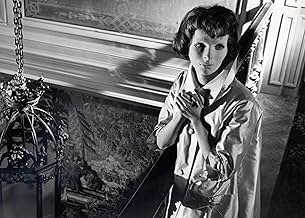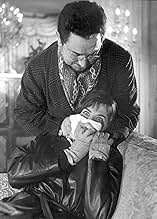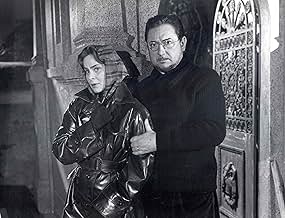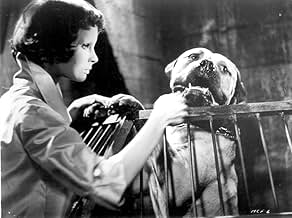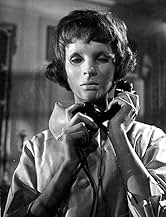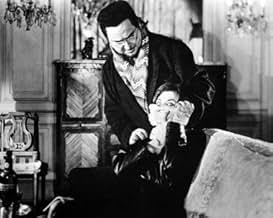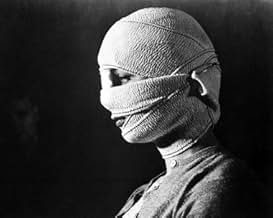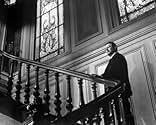VALUTAZIONE IMDb
7,6/10
37.542
LA TUA VALUTAZIONE
Un chirurgo causa un incidente che lascia sua figlia sfigurata fa tutto per darle una nuova faccia.Un chirurgo causa un incidente che lascia sua figlia sfigurata fa tutto per darle una nuova faccia.Un chirurgo causa un incidente che lascia sua figlia sfigurata fa tutto per darle una nuova faccia.
- Regia
- Sceneggiatura
- Star
Charles Blavette
- L'homme de la fourrière
- (scene tagliate)
- (as Blavette)
Charles Bayard
- Un homme à la conférence
- (non citato nei titoli originali)
Gabrielle Doulcet
- Une admiratrice du docteur Génessier
- (non citato nei titoli originali)
Recensioni in evidenza
Though EYES WITHOUT A FACE is indeed a horror film, it is also a dark tragedy. Doctor Genessier (Pierre Brasseur) and his daughter, Christiane (Edith Scob) were involved in a terrible accident, leaving Christiane in the condition suggested by the title. Now, her father is driven to fix what he has done. He is aided by his faithful cohort, Louise (Alida Valli), who lures women to their fate.
Through hideous trial and error, involving several unwary, female "subjects", Genessier is willing to destroy others in order to restore his daughter's beauty. What he really seeks is redemption, and relief from his own feeling of unfathomable guilt. His obsession to restore what he has broken makes him oblivious to all else. For Genessier, the end truly does justify the means.
For her part, Christiane is a virtual prisoner in their enormous house, doomed to wear a doll-like mask, and wander about like a ghost. Not so surprisingly, this all leads to a catastrophic conclusion. This film shocked audiences and inspired a generation of filmmakers. It holds up solidly to this day...
Through hideous trial and error, involving several unwary, female "subjects", Genessier is willing to destroy others in order to restore his daughter's beauty. What he really seeks is redemption, and relief from his own feeling of unfathomable guilt. His obsession to restore what he has broken makes him oblivious to all else. For Genessier, the end truly does justify the means.
For her part, Christiane is a virtual prisoner in their enormous house, doomed to wear a doll-like mask, and wander about like a ghost. Not so surprisingly, this all leads to a catastrophic conclusion. This film shocked audiences and inspired a generation of filmmakers. It holds up solidly to this day...
"Eyes Without A Face" is a groundbreaking and trendsetting artistic nightmare! The plot of this film has often been copied but never has it been done in such an eerily effective style. The sight of the masked daughter playing with the dogs evokes many emotions in the viewer. There are shots in this movie that will stay with you long after you have seen it! Heavily recommended!
At the time 'Les yeux sans visage' was released, the film was not very popular and faced common rejection by the critics. Regardless of those dis-affirmations, it raised to the position of a classic in the horror genre. Franju - one of the founders of the legendary Cinemathèque Française - succeeded in an intriguing way to make film history sensible as a source of inspiration of an entirely peculiar vision.
The clinic of Dr. Génessier (P. Brasseur) is located not very far from Paris. Famous as a specialist in skin grafting, nobody foreshadows that the scientific ambition of the surgeon is incident with a horrifying secret: Since an accident has destroyed the face of Génessier's daughter, Christiane (Scob), the doctor does everything to reconstruct her beauty. With the help of his assistant Louise (Valli) he clucks young women in his remote mansion, benumbs them and makes them a victim of a macabre surgical operation. In a hidden operating room in the basement of his house, Génessier removes the facial skin and transplants it on Christiane's face. Without lasting successes.
That Franjus film has not suffer losses from its immensely disturbing effects is because of, if nothing else, the camera work of Eugen Schüfftans. His brilliant black and white shots resurrects the bright dark of the expressionist German silent film. It imparts Villa Génessier a threatening life of it's own, transmutes it in a mazy horror house which seems like one can not escape. The shadows of the stairway handrails lay on everybody who enters the building like grids and makes him optically a prisoner of Génessier's delusion, mostly his daughter Christiane. Cut from a real life she haunts through the paternal ruins, the garbled face concealed behind a white porcelain mask, whose sad expression seems to nail the doom of the young woman.
Christiane's mask also points out a central principle of formation of the film: It's suspense results substantially from the interaction of visible and invisible things, of showing and dissembling. Franju subtly creates a nightmarish atmosphere that evokes the horror of Génessier's actions, but never makes it explicitly in the first instance - only to show it the viewer more pitilessly: When the surgeon unprovided cuts into the juvenilely beautiful face of one of his victims. This moment of shocking intensity reminds of the razor blade cut through the woman's eye of Bunuel's surrealistic classic 'Un chien andalou' (1929). With the same zest to provoke, Franju also presents the result of an ostensibly succeeded operation: A sober sequence of photographs shows, commented by Génessier off-stage, at first Christiane's angelically delicate face, then how the transplanted skin becomes patchy a few days later, splits open and two weeks later dies off. The cruelty of those two sequences exposes Génessier as a perverted, pestilent doctor and his paternal love as brutal obsession. The attempt to give his daughter a new face means at the same time to erase her identity, to create the ideal woman.
'Les yeux sans visage' remains in the memory of the viewer as one of the rare places on the imaginary continent, phantasmagoric and exigent with ample suspense and shocking details, a perfect alchemy of horror and allegoric poesy whereby one of the most beautiful horror films came into being.
The clinic of Dr. Génessier (P. Brasseur) is located not very far from Paris. Famous as a specialist in skin grafting, nobody foreshadows that the scientific ambition of the surgeon is incident with a horrifying secret: Since an accident has destroyed the face of Génessier's daughter, Christiane (Scob), the doctor does everything to reconstruct her beauty. With the help of his assistant Louise (Valli) he clucks young women in his remote mansion, benumbs them and makes them a victim of a macabre surgical operation. In a hidden operating room in the basement of his house, Génessier removes the facial skin and transplants it on Christiane's face. Without lasting successes.
That Franjus film has not suffer losses from its immensely disturbing effects is because of, if nothing else, the camera work of Eugen Schüfftans. His brilliant black and white shots resurrects the bright dark of the expressionist German silent film. It imparts Villa Génessier a threatening life of it's own, transmutes it in a mazy horror house which seems like one can not escape. The shadows of the stairway handrails lay on everybody who enters the building like grids and makes him optically a prisoner of Génessier's delusion, mostly his daughter Christiane. Cut from a real life she haunts through the paternal ruins, the garbled face concealed behind a white porcelain mask, whose sad expression seems to nail the doom of the young woman.
Christiane's mask also points out a central principle of formation of the film: It's suspense results substantially from the interaction of visible and invisible things, of showing and dissembling. Franju subtly creates a nightmarish atmosphere that evokes the horror of Génessier's actions, but never makes it explicitly in the first instance - only to show it the viewer more pitilessly: When the surgeon unprovided cuts into the juvenilely beautiful face of one of his victims. This moment of shocking intensity reminds of the razor blade cut through the woman's eye of Bunuel's surrealistic classic 'Un chien andalou' (1929). With the same zest to provoke, Franju also presents the result of an ostensibly succeeded operation: A sober sequence of photographs shows, commented by Génessier off-stage, at first Christiane's angelically delicate face, then how the transplanted skin becomes patchy a few days later, splits open and two weeks later dies off. The cruelty of those two sequences exposes Génessier as a perverted, pestilent doctor and his paternal love as brutal obsession. The attempt to give his daughter a new face means at the same time to erase her identity, to create the ideal woman.
'Les yeux sans visage' remains in the memory of the viewer as one of the rare places on the imaginary continent, phantasmagoric and exigent with ample suspense and shocking details, a perfect alchemy of horror and allegoric poesy whereby one of the most beautiful horror films came into being.
A brilliant surgeon, Dr. Génessier, helped by his assistant Louise, kidnaps nice young women. He removes their faces and tries to graft them onto the head on his beloved daughter Christiane, whose face has been entirely spoiled in a car crash.
The mask was really good. The way it is blank, but clearly fits to the contours of her face... it completely destroys her identity, makes it like she does not even exist as a person. I would not go so far as to say she looks worse with it on than off, but it makes her less than human for sure.
While some of the story is a bit slow, it is overall a quite strong story... part horror, part drama and part detective story. I am not surprised that many horror historians consider it among the greatest films ever made in the genre.
The mask was really good. The way it is blank, but clearly fits to the contours of her face... it completely destroys her identity, makes it like she does not even exist as a person. I would not go so far as to say she looks worse with it on than off, but it makes her less than human for sure.
While some of the story is a bit slow, it is overall a quite strong story... part horror, part drama and part detective story. I am not surprised that many horror historians consider it among the greatest films ever made in the genre.
George Franju's "Yeux Sans Visage" is extremely slow yet absolutely riveting. The direction is masterful and Pierre Brasseur is superb as the dedicated doctor whose love for his daughter leads him to commit unspeakable crimes.
The cold, sinister atmosphere of the film will seep into your bones and you may find it hard to look at the screen when the central skin-removal operation takes place - this is an extraordinarily grisly sequence for its time, lent all the more power by the cold, matter-of-fact direction and acting.
In a film full of haunting images, you will find the last one unforgettable.
Why can't modern directors make horror films as good as this? It deals with a potentially lurid, gory subject-matter with masterly subtlety and skill.
The cold, sinister atmosphere of the film will seep into your bones and you may find it hard to look at the screen when the central skin-removal operation takes place - this is an extraordinarily grisly sequence for its time, lent all the more power by the cold, matter-of-fact direction and acting.
In a film full of haunting images, you will find the last one unforgettable.
Why can't modern directors make horror films as good as this? It deals with a potentially lurid, gory subject-matter with masterly subtlety and skill.
Lo sapevi?
- QuizDuring the original release of the film in the UK in 1960, an English film critic for "The Spectator" was nearly fired for writing a positive review of it after the general critical reaction to it had been negative.
- BlooperWhen she is not wearing it, Christiane's mask is very thick and heavy and would only seem to cover her face. When she puts it on, however, it is very thin, close-fitting, and seamlessly covers her jawline and the underside of her chin, revealing that the mask itself is a prop while the actress probably wears a combination of makeup and prosthetics.
- Citazioni
Christiane Génessier: My face frightens me. My mask frightens me even more.
- Versioni alternativeThe film's original release in the U.S. in 1962 was dubbed in English, edited and re-titled "The Horror Chamber of Dr. Faustus". The surgery scene was edited for content, while any and all scenes that made Dr. Genessier seem to be sympathetic (particularly the scene where he cares for a sick boy) were cut.
- ConnessioniFeatured in Cinéma, de notre temps: Georges Franju, le visionnaire (1996)
I più visti
Accedi per valutare e creare un elenco di titoli salvati per ottenere consigli personalizzati
- How long is Eyes Without a Face?Powered by Alexa
Dettagli
Botteghino
- Lordo Stati Uniti e Canada
- 58.565 USD
- Fine settimana di apertura Stati Uniti e Canada
- 19.628 USD
- 2 nov 2003
- Lordo in tutto il mondo
- 62.793 USD
- Tempo di esecuzione1 ora 30 minuti
- Colore
- Proporzioni
- 1.66 : 1
Contribuisci a questa pagina
Suggerisci una modifica o aggiungi i contenuti mancanti

Divario superiore
By what name was Occhi senza volto (1960) officially released in India in English?
Rispondi
![Guarda Tráiler [OV]](https://m.media-amazon.com/images/M/MV5BOGQ0MzNjNTYtYTViNC00NjVjLWI2MDEtYTczMzJjMTZlZDUwXkEyXkFqcGdeQXRyYW5zY29kZS13b3JrZmxvdw@@._V1_QL75_UY281_CR0)
